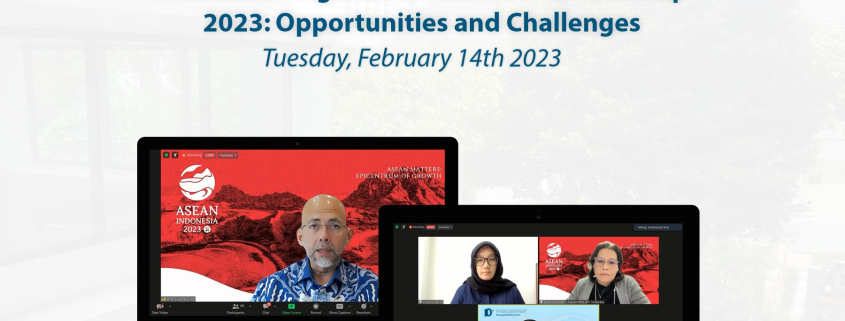Public Seminar – Indonesia’s Agenda in ASEAN Chairmanship 2023: Opportunities and Challenges
Indonesia’s Chairmanship role in the midst of the dynamics of global issues that are always challenging at this time is driven by strong initiatives to build a regional region that has a stable, fast-growing, inclusive, and sustainable economy. Indonesia’s chairmanship of ASEAN in 2023 is an important momentum that needs to be utilized to create a peaceful region that upholds human and democratic values through policy alternatives oriented to the interests of the grassroots community.
On February 14, 2023, the ASEAN Studies Center and the Faculty of Social and Political Sciences of Universitas Gadjah Mada (UGM) successfully held a Public Seminar with the title “Indonesia’s Agenda in the 2023 ASEAN Chairmanship: Opportunities and Challenges”. This Public Seminar was divided into two-panel discussion sessions and had two purposes, namely first, as an arena to highlight priority agendas that are relevant to Indonesia’s Chair in ASEAN, as well as to become a means for academics and practitioners to identify policy gaps so that, further, formulate an agenda -agenda to be accomplished. Second, building networks and increasing the role of the academic community in Indonesia’s strategic policies is especially important in efforts to build Indonesia’s leadership projection in the region and the world.
In panel discussion 1, the topic was “Geopolitical Challenges and Democracy in the ASEAN Region,” which presented two speakers, namely H.E. Sidharto R. Suryodipuro (Director General for ASEAN Cooperation, Ministry of Foreign Affairs) and Dr. Amalinda Savirani (Lecturer of Department Political and Government, UGM), and was moderated by Dr. Luqman-nul Hakim (Lecturer of Department International Relations, UGM). Based on the presentation submitted by H.E. Sidharto R. Suryodipuro, the government is quite optimistic in terms of Chairmanship in ASEAN, considering this is not Indonesia’s first experience in ASEAN Chairmanship with an “at the crossroads” situation. The most important challenge is how to build a common identity as a new ASEAN political subject in the region and in the world, which will not be easy, both internally and externally. While Dr. Amalinda Savirani explained that, from an internal perspective, there are many divergent things in Southeast Asia, which makes it difficult for us to find a common ground. But at the same time, new issues such as environment, technology, and human trafficking inevitably force us to create a common ground and are expected to have a major impact on institutional maturity in ASEAN. The external challenge is that generally there are two collective identities, namely, a common ground inside or a common enemy outside. This is a matter of geopolitical turbulence, instead of being able to make ASEAN more unified, it actually has the potential to create the polarization.
For discussion panel 2 discussed the Opportunities for ASEAN as the Epicentrum of Growth and presented three speakers namely Ni Made Ayu Marthini (Deputy Marketing for the Ministry of Tourism and Creative Economy/Agency for Tourism and Creative Economy), Nella Sri Hendriyetty, Ph.D. (Head of Center for Regional and Bilateral Policy, Ministry of Finance), and Dr. Muhammad Rum (Senior Researcher of the ASEAN Studies Center, UGM), and moderated by Yulida Nuraini Santoso (Managing Director of the ASEAN Studies Center UGM). From the presentation of the three speakers in discussion panel 2, there are 3 things that can be concluded, namely, first, the fact that the existing economic deliverables are not a single issue, so they cannot be done alone or seen as a stand-alone part. And because of that we discussed at length about cooperation and the cross-pillar mechanism, perhaps it can be strengthened. Second, Indonesia has an extra challenge as Chair this year, because there is pressure to connect with the deliverables that existed last year when Indonesia became Chair of the G20, so this puts us in the spotlight. Third, it is our responsibility as Indonesian citizens to reconcile, and perhaps also to oversee efforts to achieve existing deliverables.
From discussion panels 1 and 2, it is hoped that there will be many insights that can be developed by the community or academics as both academic ideas and policy recommendations.


 Photo by American Public Power Association on Unsplash
Photo by American Public Power Association on Unsplash
Leave a Reply
Want to join the discussion?Feel free to contribute!